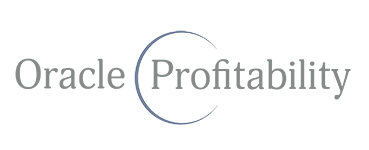How Does An Accounting System Make Me More Money?
Smart Systems for Maximum Profitability
Welcome to our blog series on Smart Systems for Maximum Profitability where we explore the latest trends and technologies that help businesses like yours achieve maximum profitability.
Did you know that the foundation of profitability for your business lies within your accounting systems? As an entrepreneur, you probably already understand how important it is to track your finances. But let's explore ways to set up your business for maximum profitability.
Accounting System Basics
This might seem baseline. But if you want to run a million dollar company someday using accounting software now is going to save you major headaches later. We know this because we’ve had clients who were using excel spreadsheets for their financials and then their business grew. It was a big ball of yarn to untangle and they lost money in the process. We don’t want that to happen to you.
We consider accounting software like Quickbooks to be the bare minimum when it comes to creating an accounting system. But most business owners aren’t using it to its full capacity and that mistake is also costing you money.
You Need More Than Software to Create a Profitable Accounting System
While we consider accounting software to be foundational to creating a good accounting system, there is so much more to running a profitable business than just getting Quickbooks.
A good system may include all kinds of software: Quickbooks, Bill.com, timekeeping software, PTO trackers, Shopify, Square, Paypal, etc. Your software is custom to your business. But no matter what software you use, we advise that these softwares are connected to a central hub.
A good accounting system paints a clear, up to date picture of what your finances look like at any given moment. You should be able to specifically measure things like how much you paid your employees, what their monthly salary is, what your business expenses are, and whether or not you’re profitable at any given moment in time.
Here’s how not having a connected accounting system can get you into trouble. Say you log on to Quickbooks and your revenue says you have 2 million dollars in your account. You decide to buy some much needed equipment for your business. But later, you realize that you forgot to include the cost of payroll because you keep that on a different software. Your payroll is a large expense and costs you 1 million dollars. Deciding to purchase that equipment without understanding your real bottom line is the kind of decision that can spell disaster for many businesses.
On the flip side, if you had a centralized accounting system and you saw that you had 2 million dollars at the beginning of the month and had spent 1 million on payroll. You’d know that not only should you hold on buying the equipment but you might also ask yourself some other questions. Why is my payroll cost so high? Who is being paid the most income? Who is bringing in the most sales? What are others paying in my industry? What sorts of changes do I need to consider to lower my payroll costs?
In short, a great accounting system is greater than software. It works best when it’s customized for your business. We know that this sort of system can give you better visibility into the financial health of your company and help make you more profitable.
How Does An Accounting System Save Me Money?
Accounting systems increase efficiency in your business. By automating tasks like invoicing, bookkeeping, employee hours, and financial reporting, you eliminate manual data entry and reduce the risk of human error. This not only saves you time and energy, it can also save you money in the long run by preventing costly mistakes.
Any good accounting system worth its salt will have features that help you track expenses and identify areas where you might be overspending. By gaining a better understanding of your finances, you’ll be able to make more informed decisions and allocate your resources more effectively.
How Does An Accounting System Prevent Fraud?
Let's face it, fraud is a major concern for any business. An accounting system can be a powerful tool in helping prevent fraud by providing a level of transparency and accountability that manual bookkeeping simply can't match.
Fraudsters often try to manipulate financial records to cover their tracks, but most accounting software have built-in controls to help prevent this from happening. These controls include things like audit trails, which record every transaction, and restrict access to certain financial data. This makes it much more difficult for someone to alter or delete records without being caught. Plus, automated alerts can flag transactions that look suspicious or out of the norm, allowing for immediate investigation.
Common Mistakes People Make When Setting Up Accounting Systems
Setting up accounting systems can be a daunting task for anyone, even for those with an accounting background. It's important to get it right to ensure smooth financial management for your business. One of the most common mistakes that people make when setting up their accounting systems is failing to customize their software to match their specific needs. It's essential to spend time to set up the system correctly to cater for the unique aspects of your business.
Another critical mistake is failing to reconcile bank statements regularly. This mistake can lead to incorrect data in your accounting system and, ultimately, poor business decisions. Be sure to check in on your accounting systems with your accountant on a regular basis and reconcile monthly to avoid these common mistakes.
One More Way You Can Save Money By Setting Up An Accounting System
Have you ever forgotten to pay a bill on time and faced late payment fees? Trust me, it happens to the best of us. But with a well organized accounting system, you can avoid those pesky fees. There are various softwares that can generate a payment schedule based on your cash flow, alerting you to upcoming bills and their due dates. No more scrambling to pay bills at the last minute! Plus, with the added convenience of automatic payments, you can sit back and relax knowing your bills are taken care of.
Ultimately, an accounting system offers you endless opportunities to save time and money. With its helpful tracking capabilities and automated tasks, it can take the hassle and stress out of managing business finances. You don’t need to be a financial whiz to benefit from a high functioning accounting system. Whether you’re just starting up or have been in business for years, a central accounting system is an invaluable tool that every company should consider investing in.
Hire A Pro
We know that setting up an accounting system can be intimidating, but it doesn't have to be. Oracle Profitability is Quickbooks Certified in Enterprise, Online, and Desktop. We’re also certified in Bill.com. We’ve worked across multiple platforms with many different softwares to help our clients create more profitable accounting systems. We’ll help you customize yours so that it’s a automated powerhouse that saves you money. Then you can focus on the parts of the business that you love. Schedule your free consultation with us today!
Check out our other blogs on Smart Systems for Profitability.



